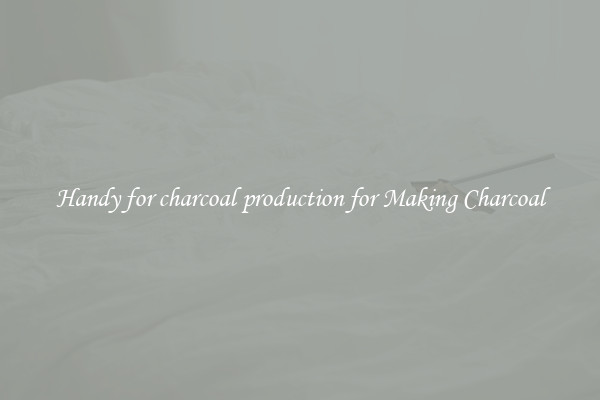Handy for charcoal production for Making Charcoal
Charcoal has been used for centuries as a fuel source for cooking and heating. It is created through a process called carbonization, in which organic material such as wood or coal is burned at high temperatures in an oxygen-deprived environment. While traditionally charcoal was produced in large kilns or pits, there is a growing interest in small-scale charcoal production using handy methods.

One popular method for producing charcoal on a smaller scale is the use of a handy or portable charcoal kiln. These kilns are typically made from metal or ceramic and are designed to be easily transported and operated by one or two people. Charcoal production using a handy kiln is a relatively simple process that can be done in a backyard or forest setting.
To create charcoal using a handy kiln, organic material such as hardwood or coconut shells is loaded into the kiln and heated to high temperatures. As the material burns, volatile compounds are released and the wood is slowly carbonized, creating charcoal. The process typically takes several hours to complete, depending on the size of the kiln and the type of material being used.
Handy kilns are popular among small-scale charcoal producers for several reasons. They are relatively inexpensive to purchase and operate, making them accessible to individuals or small businesses looking to produce charcoal for personal use or sale. Additionally, handy kilns are more environmentally friendly than traditional charcoal production methods, as they produce less smoke and carbon emissions.
Another advantage of using a handy kiln for charcoal production is the ability to control the quality of the charcoal being produced. By carefully monitoring the temperature and airflow of the kiln, producers can ensure that the charcoal is of high quality and free from impurities. This is especially important for those using charcoal for cooking or grilling, as impurities can affect the flavor of the food being cooked.
While handy kilns offer many benefits for small-scale charcoal production, there are some challenges to consider. The process can be labor-intensive, requiring constant monitoring of the kiln to ensure that the temperature remains consistent. Additionally, the use of organic material for charcoal production can contribute to deforestation if not managed sustainably.
Overall, handy kilns are a convenient and sustainable option for those looking to produce charcoal on a small scale. By carefully monitoring the production process and using high-quality organic material, producers can create charcoal that is both environmentally friendly and of high quality. Whether for personal use or sale, handy kilns offer a practical solution for charcoal production.

View details

View details

View details

View details








